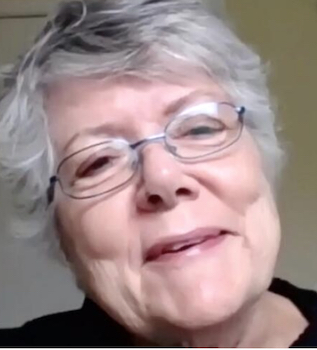On this date in 1942, Sally Roesch Wagner — historian, author, educator and activist — was born in Aberdeen, S.D., the state’s third-largest city (pop. 25,000) — to conservative Republican parents who were Congregational Church members.
Wagner had a brother and a sister. The family was upper-middle class and socially prominent. Her father, a banker, had German-Russian roots, and her mother’s father served three terms as Aberdeen mayor. “My mom was a brilliant, creative woman who was locked into the impossibility of actualizing herself in the 1950s and suffered as women did during that time. Seeing her caged in that way and seeing the potential that she had when she could escape slightly from it, said to me I will never be that.”
Still, her mother was an engaged parent and headed a statewide Republican women’s group. “She raised me with an egalitarian sense of the worth of human beings without putting price tags on them, which was an incredible gift. I didn’t realize it at the time.” (Veteran Feminists of America interview for Pioneer Histories Project, December 2021)
“My father was the patriarch of the family, and that was the way it was supposed to be. My mother should have been out there doing all kinds of things in the world, and instead she was on Valium. How many women during the ’50s were on Valium?” (Undated interview, Binghamton University Libraries)
Wagner got pregnant at age 17 soon after high school in 1960. At that age in South Dakota and without parental support, abortion was not an option. She married and had another child before long. They had moved in with her husband’s parents in Sacramento, Calif., where she attended Cal State. “I didn’t know about socialism, took a class in economics and realized, oh, my God, I’m a socialist, and my husband was a raging capitalist, and the differences just became greater and greater. He died a couple of years ago, a total Trump supporter, an alcoholic and a non-viable parent, almost from the get go.” They had divorced in 1965. (Ibid., Veteran Feminists)
“Bob Dylan’s ‘Like a Rolling Stone’ got me out of my marriage. That was my support system. ‘Once upon a time, you dress so fine. Threw the bums a dime in your prime, did not you?’ That was my song. This is the song about a white, middle-class married woman leaving her life behind in a moment when getting a divorce was a travesty in my family and among everybody I knew.” (Ibid., Binghamton)
Wagner earned bachelor’s and master’s degrees from Cal State and in 1975 received a doctorate in women’s studies from UC-Santa Cruz. She actively protested against the Vietnam War and on behalf of women’s liberation and was arrested twice for civil disobedience in the early 1980s while dressed up as suffragist Matilda Joslyn Gage. On occasion she also performed as Elizabeth Cady Stanton.
She called the first arrest a “birthing gift” to her grandson Michael, holding his photo while demonstrating at the Seneca Army Depot in New York to protest sending armaments to Europe. The next arrest was on Native American land at a Nevada test site for nuclear weapons. Both charges were eventually dropped but she was strip-searched and handcuffed in detention.
She helped found the women studies’s program at her alma mater Cal State-Sacramento, where she taught for several years before teaching at Mankato State University in Minnesota from 1981-1985. Wagner began work as a visiting professor at Syracuse University in 1997, teaching classes on women’s suffrage and other activist history. She was named Humanist Heroine of the Year by the American Humanist Association in 1992.
She received a National Endowment for the Humanities Fellowship and grant to research Gage. She bought the home Gage lived in from 1854 until her death in 1898 in Fayetteville, N.Y., and in 2002, she turned it into the Matilda Joslyn Gage Museum and Center. “Gage… understood that traditional Christian beliefs have shaped every aspect of women’s lives from the time of Constantine to the present day, and she insisted that they must be challenged directly.” (Feminism and Religion, Nov. 29, 2021)
When asked about priests Daniel and Philip Berrigan, who were brothers and fierce critics of U.S. militarism, Wagner said, “I think [they are] the reason I do not hold the entire Catholic Church in contempt. Examples of how even in an obsolete and corrupt institution, there can be integrity and goodness.” (Ibid., Binghamton)
She died of undisclosed causes in New York at age 82. (D. 2025)


